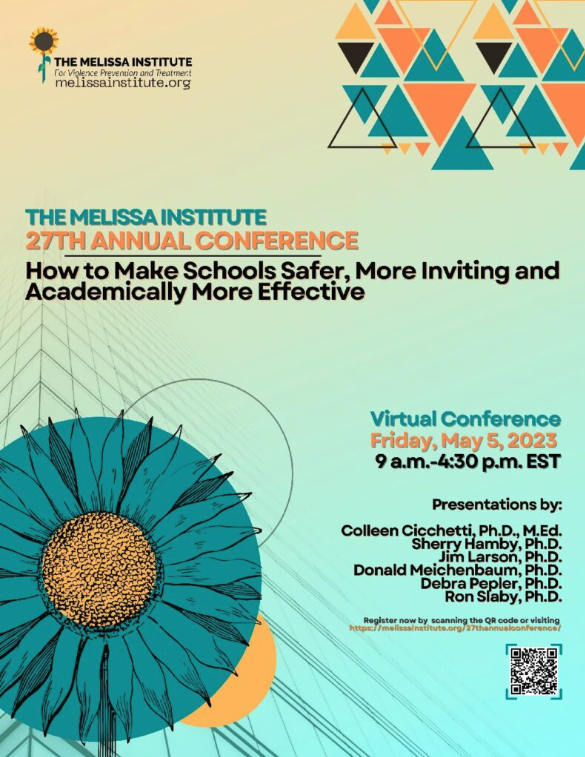The Melissa Institute 27th Annual Conference: How to Make Schools Safer, More Inviting and Academically More Effective
The Melissa Institute delivers the Year 1 Evaluation Report for the Peace & Prosperity Plan of Miami-Dade County
January 17, 2023Skills, Self-Direction, and Applications for Better Math Instruction
April 24, 2023Join us on Zoom on Friday, May 5, 2023 9 a.m.-4:30 p.m. EST
About
Congress has recently appropriated funds to make schools safer and pedagogically more effective. This virtual conference will focus on how to effectively use this opportunity to meet the daunting challenges students, families and administrators face, including school shootings, violence, bullying and the emotional and behavioral sequelae of adverse childhood experiences.
Research shows that peaceful schools do not arise simply from installing bulletproof windows, arming teachers or expelling troublemakers. Instead, peaceful schools come when the academic and social-emotional needs of the students within its walls are understood and substantially met in culturally responsive ways.
Creating safe schools is a momentous and often frustrating undertaking. Experience has shown that simply adding a new program or instituting a new policy will have little measurable effect. Even those schools that approach the problem systematically with evidence-based programs and procedures need to do so with humility and respect for the challenge they are facing. In addition, research on the impact of childhood trauma and adverse experiences shows that everyday relationships with teachers, caregivers and prosocial friends have restorative effects. A sense of belonging, school connectedness and an inviting school environment of respect and mastery are crucial to bolstering resilience.
The Melissa Institute’s internationally renowned faculty will share research-based knowledge, programs and practices necessary to create safe, inviting and academically effective schools. Dr. Ron Slaby will review effective strategies and challenges distilled from decades of school-based violence prevention efforts; Dr. Colleen Cicchetti will show what it takes to create and operate a trauma-responsive school; Dr. Debra Pepler will tell us how to use a developmental-relational model to create a nonviolent and healing school environment; Dr. Sherry Hamby will present proven strength-based strategies to foster resilience at school; Dr. James Larson will talk about how to prevent and effectively respond to student anger and aggression; and Dr. Donald Meichenbaum, the Institute’s Scientific Director, will demonstrate how cognitive behavioral approaches –– including trauma-focused cognitive behavioral therapy and other resilience-engendering preventive approaches –– can be used to create safe spaces for diverse youth, addressing various developmental needs and risk factors.
Learning Objectives
Participant will be able to:
- Identify and overcome obstacles in the implementation of school-based violence prevention programs.
- Explain the role of trauma-responsive structures and practices to promote safety, connection, engagement and belonging in schools.
- Integrate into the school environment strength-based and developmentally oriented knowledge and strategies to foster resilience and promote healing.
- Incorporate into professional practice evidence-based skills and interventions to promote safety and respond to student anger and aggression.
Target Audience
Teachers, administrators, school counselors, psychologists, social workers, family mediators, mental health workers, marriage and family therapists, social services agency personnel, juvenile and family-court judges, lawyers, law enforcement personnel, nurses, pediatricians, primary care doctors and physicians.
Free General Registration
$60 donation For Continuing Education Credits
Following registration, you will be sent the zoom link.
Presenters:
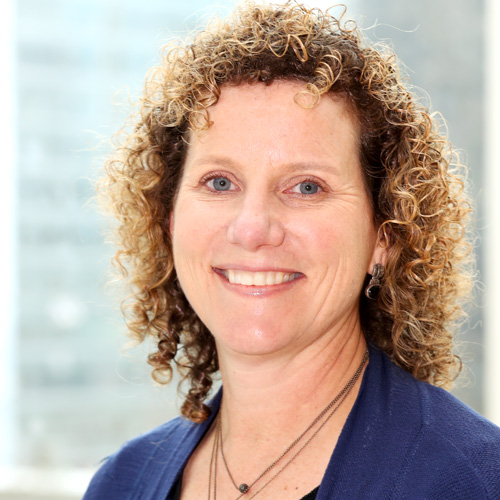
Colleen Cicchetti, Ph.D., M.Ed.
“Building Trauma-Responsive Schools Through School-Community Collaboration”
Dr. Colleen Cicchetti is executive director of the Center for Childhood Resilience (CCR), a clinical psychologist at Ann & Robert H. Lurie Children’s Hospital of Chicago and an associate professor at Northwestern University’s Feinberg School of Medicine. She has over 30 years of experience in hospital, outpatient and community settings, and is passionate about and committed to addressing health disparities and decreasing exposure to violence and trauma for children and families through innovative, healing-centered public health strategies and multidisciplinary collaboration. Throughout her career, Dr. Cicchetti has focused on connecting children with the mental health services they need, equipping providers with effective programming, and identifying new evidence-based interventions that address the emerging mental health needs of children and youth. In 2004, Dr. Cicchetti founded CCR (formerly known as the Community Linked Mental Health Services Program) to promote system change to reduce health disparities and promote mental health and wellness where kids live, learn and play. Through training, education and outreach to school professionals, community agencies, city leaders and caregivers, CCR promotes increased access to high-quality mental health services for children and adolescents throughout Illinois and nationwide.

Sherry Hamby, Ph.D.
“Mindfulness Research and Strategies to Foster Resilience at School”
Sherry Hamby, Ph.D., is Distinguished Research Professor of Psychology at the University of the South in Sewanee, Tennessee and Director of the Life Paths Research Center. She is also founder and co-chair of ResilienceCon. An internationally recognized authority on victimization and trauma, she is best known for her work in poly-victimization, resilience and violence measurement. A clinical psychologist by training, Dr. Hamby has worked for more than 25 years on the problem of violence, including front-line crisis intervention and treatment, involvement in grassroots organizations, and research leading to the publication of more than 200 articles and books. An influential researcher, she has been ranked in the top 1% among more than 6 million researchers in 22 disciplines based on citations to her work. Her awards include Outstanding Contributions to the Science of Trauma Psychology from the American Psychological Association (APA). Dr. Hamby’s work has been highlighted in the Washington Post, Huffington Post, CBS News, Psychology Today and hundreds of other media outlets. Her newest book, with Victoria Banyard, is Strengths-Based Prevention: Reducing Violence and Other Public Health Problems (APA Books, 2022). Check out her TEDx Talk, Trauma is Everywhere, But So Is Resilience.
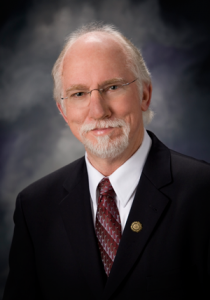
Jim Larson, Ph.D.
“Five Principles for Counseling Reactive Aggressive Students”
Dr. Jim Larson is Professor Emeritus in the Psychology Department of the University of Wisconsin – Whitewater and one of the founding members of The Melissa Institute’s Scientific Board. He has over 30 years of experience in the school, community and youth residential treatment settings, including 14 years as a school psychologist for the Milwaukee Public Schools. He has presented nationally and abroad on the subject of treating child and adolescent anger and behavioral concerns and has been the recipient of university awards for teaching excellence. Dr. Larson has written multiple journal articles and book chapters on youth violence prevention, and is the author of Think First: Addressing Aggressive Behavior in Secondary Schools, and co-author of Helping School Children Cope with Anger: A Cognitive-Behavioral Intervention.
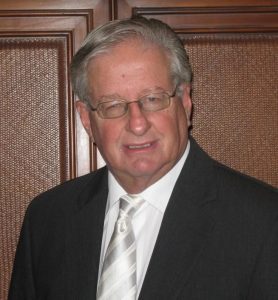
Donald Meichenbaum, Ph.D.
“Cognitive-Behavioral Therapy Strategies to Address Trauma and Promote Resilience”
One of the founders of cognitive behavior therapy, Donald Meichenbaum, Ph.D., was voted among the 10 most influential psychotherapists of the 20th century by North American clinicians. He has presented in all 50 states and internationally. He has published extensively and his most recent book is Roadmap to Resilience has been downloaded by more than 40,000 people in over 130 countries. Other books include Treatment of Individuals with Anger-control Problems and Aggressive Behavior, Treating Adults with Posttraumatic Stress Disorder, Nurturing Independent Learners, and Stress Inoculation Training.
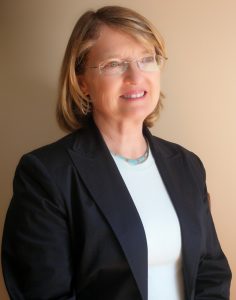
Debra Pepler, Ph.D.
“Creating a Nonviolent and Nurturing Environment for All Students at School”
Debra Pepler is a Distinguished Research Professor of Psychology at York University. Her research has focused on relationships within the family and peer group, with a growing interest in the importance of healthy relationships for healthy development. She developed an innovative observational method to study aggression, bullying and victimization. Her research on peer and family relationships has been embedded in interventions: Breaking the Cycle for substance-using mothers and their young children, Bullying Prevention with the Toronto Board of Education, SNAP (Stop Now and Plan) for aggressive children and their parents, Pine River Institute for youth with addictions and mental health problems, and the Canadian Red Cross for violence prevention in indigenous communities. Dr. Pepler co-founded and co-led PREVNet (Promoting Relationships and Eliminating Violence Network) to promote healthy relationships and prevent bullying for children and youth (www.prevnet.ca).

Ron Slaby, Ph.D.
“Comprehensive School-Based Violence Prevention: Lessons Learned and Challenges Ahead”
Ron Slaby, Ph.D., is a developmental psychologist, research scientist and educator. Previously an associate professor at Harvard University’s Graduate School of Education, he now serves as a senior scientist at Boston Children’s Hospital/Harvard Medical School. Through his innovative research, teaching and program development, Dr. Slaby has helped shape national and global strategies for preventing violence and bullying. He has co-authored the CDC’s first National Agenda for Preventing Violence, the World Health Organization’s global program for Preventing Violence in Schools, and the American Psychological Association’s National Commission Reports on Violence and Youth. He has also developed evidence-based programs to help prevent school violence, bullying and men’s violence against women.
Important Information for CE Credits:
CE Broker Course #20-1002190
PSYCHOLOGISTS: The Melissa Institute for Violence Prevention & Treatment is approved by the Florida Board of Psychology and by the American Psychological Association to sponsor 6 continuing education credits for Psychologists. The Melissa Institute for Violence Prevention & Treatment maintains responsibility for this program and its content.
SCHOOL PSYCHOLOGISTS: The Melissa Institute has been approved by the Florida Board of School Psychology and (NASP) the National Association of School Psychologists to sponsor 6 continuing education credits for School Psychologists. (NASP provider #:1167)
FLORIDA BOARD OF CLINICAL SOCIAL WORK, MARRIAGE AND FAMILY THERAPY AND MENTAL HEALTH COUNSELING: The Melissa Institute has been approved by the Florida Board of Psychology and the Florida Board of Clinical Social Work, Marriage and Family Therapy and Mental Health Counseling to sponsor 6 continuing education credits for mental health professionals including LCSW, LMHC, and LMFT.
EDUCATORS: Conference registration and payment to The Melissa Institute must be completed prior to registering for Miami-Dade County Public Schools professional development credit online at http://calendar.dadeschools.net. Six (6) master plan points will be awarded to participants who have completed a follow-up activity and have preregistered online with M-DCPS.
MEDIATORS: The Melissa Institute for Violence Prevention and Treatment is a recognized provider of Continuing Mediator Education (CME) credits for Florida Supreme Court-certified mediators. This course is eligible for up to 7 CME hours for certified mediators. Mediators are required to self-report those hours applicable to their areas of certification at the time of their renewal. For more information on the CME requirement, visit www.flcourts.org and select Alternative Dispute Resolution/Mediation.
Upon request, The Melissa Institute will provide a certificate of completion that can be self- reported to other boards. We cannot guarantee that it will be accepted by other boards for approval.
IMPORTANT DISCLOSURE: None of the planners and presenters for this educational activity have relevant financial relationship(s)* to disclose with ineligible companies* whose primary business is producing, marketing, selling, re-selling, or distributing healthcare products used by or on patients. Financial relationships are relevant if the educational content an individual can control is related to the business lines or products of the ineligible company.

